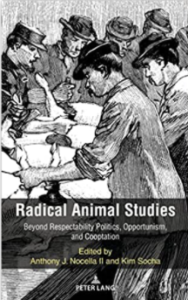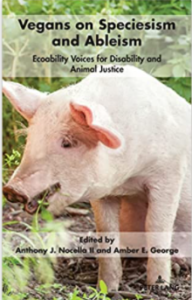Kelly Struthers Montford
“Protecting Canadian families”: Producing Normative Alimentary Identities Through “Meat”-Safety Public Health Campaigns
By, Kelly Struthers Montford, PhD Candidate of Sociology at the University of Alberta
Abstract
In November 2012, the Safe Food For Canadians Act (SFCA) received royal assent. The government claims that the act “modernizes” food safety regulations to benefit consumers, producers, and trade. The passing of this Act is said to be in response to the listeriosis outbreak in 2008, and is consistent with this Government’s general emphasis on “public safety.” I argue that “uncertainty” created by nonhuman agents (such as farmed animals, disease, and pathogens) can be turned to reinforce familiar economic and political agendas such as nationalism, international trade, and open markets. This moment of food safety results in a certain and speciesist political ordering of life. I argue that Canadian food safety legislation is a tactic deployed in an ongoing project of securing and sanitizing animal flesh in order to bolster the consumption of animal-based products, and in turn the Canadian economy. My analysis is informed by Foucault and Derrida’s work regarding the relationship between law, sovereignty, and biopolitics to understand the ways in which the expression of food safety via law works as an instrument of the state in the service of the economy, and how it defines whose lives are worthy of legal protection, and who are excluded and rendered noncriminally killable.
Food safety legislation normalizes the presence of foodborne pathogens in meat, and seeks to manage the risks, rather than addressing the conditions (e.g., humans’ consumption of animals and therefore animal agriculture) that produce these risks. The aims of these legislative changes (securing the practice of meat-eating) are also attached, produced, and deployed by state institutions using various strategies. I analyze the measures Canadians are instructed to take by institutions such as Health Canada, Public Health Canada, and the Canadian Food Inspection Agency in order to reduce the potential harm of meat-based threats. I explicitly show that these programs target the unit of the family. In so doing, I argue that by targeting the family these tactics operate within a biopolitical frame. These programs work to reproduce animal-based diets as properly Canadian, and are deployed alongside dominant Canadian norms concerning family and national identity. Specific relationships-to-self that consumers are placed in because of product recalls, public health warnings, nutritional advice, and public health meat-handling advice will be considered. This will provide an opportunity to analyze the relationship between meat-crises and the (un)changing nature of food practices concerning meat-eating as a result of food-borne illness. The body will be considered as a point of application for, and vehicle of, dominant power relations, which I theorize as an aspect of the operation of agricultural power.
Bio
Kelly Struthers Montford is a SSHRC Canada Graduate Scholar and PhD Candidate in the Department of Sociology at the University of Alberta. Her research interests include critical criminology, women’s imprisonment, and critical animal studies, specifically meat-eating culture, and the role of food safety laws and alimentary normalization. She is the 2014 ICAS Hilda Scholar of the year. She sits on ICAS board as North American Director, and is an editorial board member of the Journal of Prisoners on Prisons. Her work has been previously published in PhaenEx Journal of Existential and Phenomenological Theory and Culture, Societies, and The Canadian Journal of Women and the Law.





